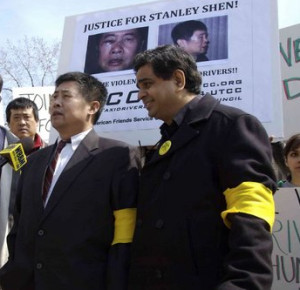FAYEZ KHOZINDAR TALKS ABOUT 400 W. SUPERIOR
GREGORY TALKS ABOUT 400 W. SUPERIOR
Ted Budzynski Tells His Story About 400 W. Superior
All posts by admin
Rahm Schemes to Get Rid of Fingerprinting

Thanks to a very clever series of moves by Mayor Rahm Emanuel, the giant rideshare company Uber has finally got its way. Their Chicago drivers will not have to be fingerprinted. While he was at it, he dealt another blow to the shrinking cab business, eliminating fingerprinting for cabdrivers too. All of this rests on the interpretation of a seemingly harmless opportunity for cab companies, included in a long list of reforms to help the industry that were approved in November as part of the 2018 budget.
“Allow taxicab companies to choose fingerprinted-based or non-biometric based criminal background check when onboarding taxicab drivers. Applicants must still clear criminal and driving history thresholds.” No member of the Progressive Caucus, and very few other aldermen realized when they approved the budget that they were eliminating fingerprinting immediately for ride share drivers and cab drivers alike. How could they, considering the intentionally misleading item slipped in to a list of agreed upon reforms? So how did Rahm pull off this coup? With a series of clever moves starting a month before the budget vote.
1) New Reform Item
October 23, BACP Commissioner Rosa Escareno met with half of the Mayor’s Taxi Task Force to
release the final version of reforms for the industry that the Task Force had been working’ on for
a year. But there was a new item listed in their reforms,item 2 b, which was the one allowing companies
not to fingerprint, cited above. Two cab drivers on the Task Force objected loudly, saying
it could pave the way for eliminating fingerprinting. When the Commissioner presented the list of
reforms to the other half of the Task Force, there was strong resistance from the owners. Some
complaining personally to the Commissioner. Divide and conquer. The Item remained.
2) The Fingerprint Study
Nov. 6, the City finally released the long overdue Fingerprint study. Announced in June of 2016 as
a six-month study to determine if fingerprinting is discriminatory, the study does not mention race
or discrimination. It’s a brief paper by an assistant professor at the U of I Chicago comparing cab
drivers and ride share drivers in various ways, and concluding they are very similar. This was enough
for the Commissioner to proclaim that there isn’t much difference. What about discrimination?
Anyone asked to study the question would point out that fingerprinting itself is not discriminatory;
it’s factual. What can be unfair is the way the information is used in hiring decisions. Anyone studying
the question would then check to see how it’s been used by the city in hiring cab drivers, and find
there is one obvious unfair provision, barring employmentfor possession of a small amount of pot.
The obvious solution would be to eliminate that provision. But then fingerprinting would not be
discriminatory anymore.
3) Part of budget
Passed Nov. 21. The mayor made the list of taxi reforms, including the new fingerprint item, part of
his 2018 City Budget, bypassing the Transportation Committee. The press concentrated on other
parts of the budget, including a slight tax increase on Uber and other rideshares. It wasn’t until after
the budget was passed that the Sun-Times announced the innocuous sounding fingerprint item
meant the immediate end to fingerprinting for cab drivers (presumably told so by the city or Uber’s
P.R. firm.) The article went on to scold the city council for endangering public safety, but that was
hypocritical since the paper had never warned the public about what was at stake. When a member of
the Progressive Caucus tried to get the fingerprint issue on the finance committee agenda, the city refused
to allow it. So, with the passage of the budget, the mayor had finally got rid of that pesky fingerprint
issue after two years of false starts. And the three-pronged attack was hugely successful. Very
clever of Rahm and his PR company. Two years earlier Uber had to spend millions of dollars on
T.V. commercials and P.R., and former Obama campaign manager David Plouffe had to personally lobby
aldermen and threaten that Uber would leave Chicago if the city council insisted on fingerprinting.
This time the whole fingerprinting issue was quietly buried by deceptive language in a deceptive place.
Very clever, and deeply cynical.
CHRIS CHANDLER, UTCC Voice
Lawsuit claims Uber cofounders stole idea for ride-sharing app
Every new startup wants to be the “Uber of . . .” its own industry, but now an entrepreneur is claiming the popular ride-sharing app was actually stolen.
Uber leaves Kansas, could your state be next?
The Kansas law requires transportation network companies, which is the legislature’s term for ridesharing, to adhere to certain rules including criminal background checks for drivers and carrying $1 million in insurance when a fare is in a vehicle. The state’s governor, Sam Brownback, actually vetoed the bill, but both the Senate and House there overrode his decision.
3 taxi drivers robbed at gunpoint on Near West Side, police say
CHICAGO (WLS) —
Chicago Police are warning citizens after they say three taxi drivers were robbed at gunpoint in the city’s Near West Side last week.
In all three incidents, which occurred the evening of April 8, a male, black offender, 20-25 years old, wearing a dark hat, sunglasses, a black jacket with white lettering and black pants hailed cab rides to locations near CTA entrances. As the offender prepared to exit the cabs, he displayed a black pistol and demanded money or cell phones.
The offender is believed to have then fled on foot to train entrances.
Uber Lawsuit
Uber drivers have filed a class action lawsuit claiming they have been misclassified as independent contractors and are entitled to be reimbursed for their expenses that Uber should have to pay, like for gas and vehicle maintenance. The lawsuit also challenges Uber’s practice of telling passengers that the gratuity is included and not to tip the drivers, even though you are not getting a tip!!
Here’s Where Uber Operates And Where It Is Banned
As Uber’s reach widens, so do the company’s legal troubles.
Several Southeast Asian countries are questioning Uber’s legality in light of allegations that a driver raped a young female passenger in India.
New Delhi has banned the ride-sharing service, and Thailand soon followed suit. The company is also facing scrutiny in Vietnam, Singapore, and Indonesia. And Indian police are reportedly considering taking legal action against Uber, saying the company hasn’t run proper background checks.
UBER BANNED IN TAMPA BAY
Hopefully, this will force Uber to comply with all the Tampa Bay taxi regulations like getting commercial insurance for all cars, pay city taxes, DO REAL Background checks for drivers, do regular inspections on cars, stop lying to drivers about possible income, stop lying to customers about “tip is included policy”, stop lowering rates on a whim with disregard for drivers livelihood, etc.
Another cabdriver attacked brutally, attacker still at large “An Attack on One is an Attack on All!”
 Cabdrivers are demanding stricter safety measures and stringent enforcement mechanisms for attacks against cabdrivers after another driver was brutally attacked in late January.
Cabdrivers are demanding stricter safety measures and stringent enforcement mechanisms for attacks against cabdrivers after another driver was brutally attacked in late January.
Drivers are calling for the placement of driver safety placards in all City of Chicago cabs and demanding that offenders be charged with a felony, as required by Illinois law. According to recent studies, taxi drivers are the highest risk of workplace violence of any profession which does not necessitate the use of weapons.
According to cabdriver advocacy United Taxidrivers Community Council (UTCC), cabdrivers are most often attacked “simply because the attackers know they can easily get away with it.”
The attack on Walid Ziada, a Chicago cabdriver who was one of the complimented drivers in the taxi industry according to the Department of Business Affairs and Consumer Protection (DBACP), has once again brought to light the growing number of violent crimes against cabdrivers.
Mr. Ziada was working late one night and pulled over for what he thought were customers who attacked him resulting in a fracture. One of the attackers was arrested and charged with a misdemeanor while the other attacker still remains at large. Illinois statue states that “Battery of an on-duty taxi driver is a Class 3 felony, punishable by up to 5 years imprisonment” (720 ILCS 5/12, 730 ILCS 5/5-8-1).
“I want to make sure this never happens again….” The UTCC has re-launched its driver safety campaign after the attack on Mr. Ziada and has resolved to ensure driver safety. One of the demands that the group has put forth is for the State’s Attorney’s Office to upgrade the charges against Mr. Ziada’s attackers to a felony.

The group is engaging in meetings with City Council members to find methods to decrease violent crimes against cabdrivers in their respective wards. It is also calling on City of Chicago Aldermen to sign the “Not in My Ward” pledge where the Alderdmen commit to eliminating violence against drivers in their areas.
UTCC is also calling on all cabdrivers who are survivors of violent crimes, know individuals who have been attacked or are personally affected by it to step forward and speak out against crimes that have taken the lives so many drivers.

Settlement in Stanley Shen’s Civil Suit

Thomas Gniadek, the batterer in the case of Stanley Shen, entered his voluntary guilty plea in criminal court and was found guilty by Judge Gaughan.
His sentence was 10 days in the House of Corrections (time served, considered served), plus 364 days of probation together with a fine of $500 and $30 per month for probation costs.
He has paid every dime of Stanley Shen’s medical expenses, every penny of his lost wages and a good bit for breaking Stanley’s nose and leaving him with 12 stitches that were taken in his face.
That payment was made from Gniadek’s own pocket, not from insurance funds. The payment was consideration for a purchase of peace in the civil lawsuit filed on Stanley’s behalf in the Law Division of the Circuit Court of Cook County, Illinois.
And there are funds enough so as to repay all of the many who volunteered donations to finance the court costs to initiate that lawsuit; Stanley has instructed me to see to it that every dime is repaid.
In addition funds have been offered by the workers compensation insurance company for Stanley’s cab lessor that roughly double the amount being paid by Gniadek.

Subject to the approval of the Illinois Workers Compensation Commission, payment will have been made so as to compensate Stanley for the damage done that he’ll have to look at every time he shaves for the rest of his life.
The moral of the story is that the rights available to cab drivers in Chicago are extensive and need to be taken advantage of rather than passed for fear of being crushed by the system or ignored.
It wasn’t me in particular who achieved anything so unique. Any decent lawyer helping someone like Stanley could do the same, maybe better.
The hope I have is that the lesson is going to have been learned by thousands of drivers. That can only happen if people like you spread the word. Would that you will do so.

